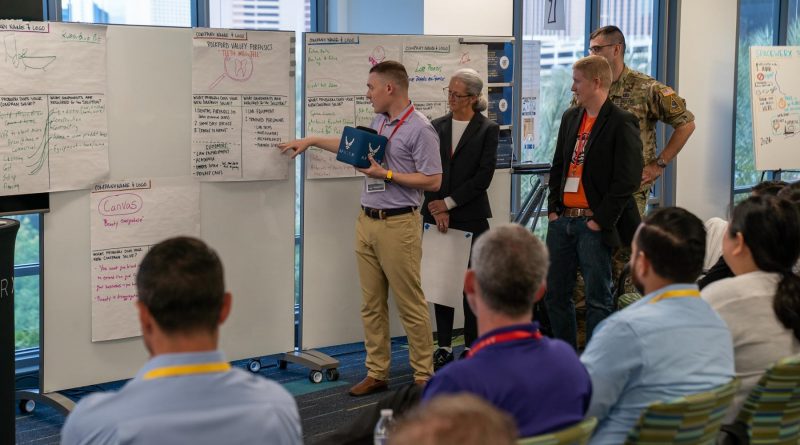AFWERX Challenge catalyzes future technology advancements
AFWERX Challenge brings companies, academia, and the government together to collaborate via workshops, crowdsource idea campaigns, and showcase events to find solutions quickly. While the standard government contracting process can take multiple years, on average, technologies vetted through the Challenge model move from selection to a formal agreement in 12 weeks.
AFWERX Challenge brings companies, academia, and the government together to collaborate via workshops, crowdsource idea campaigns, and showcase events to find solutions quickly. While the standard government contracting process can take multiple years, on average, technologies vetted through the Challenge model move from selection to a formal agreement in 12 weeks. (U.S. Air Force photo by Melissa Spencer)
With the ever-evolving needs of the modern warfighter, AFWERX stands at the forefront of the relentless pursuit of innovation and collaboration. New and inspiring ways to capture those interests must be met through various strategies, and AFWERX’s latest approach is the Weapons Program Executive Office (PEO) Design Sprint and Challenge. Showcased in the name, the Weapons PEO is an incubator for weapons-based technologies and advancements.
“Our first Weapons PEO Challenge has participants working with the Armament Directorate to design an enterprise test vehicle that will serve as the baseline architecture for future low-cost cruise missile variants,” said Cayley Dymond, AFWERX Challenge team lead. “The Directorate’s objective is to design a weapon with a range of approximately 500 nautical miles, high subsonic speed, and a cost goal of $150,000 per unit in bulk orders.”
Additionally, the teams are tasked with increasing weapons capacity and affordable mass delivery. They also must ensure that the outcome is scalable and readily available for partner nations and allies. Addressing the criteria was the Design Sprint, which concluded in September.
The Design Sprint was a condensed, super-focused workspace where teams collaborated to ideate and kickstart the innovation process. It showcased experts across the weapons innovation community, including Sandia National Lab, Federally Funded Research and Development, Massachusetts Institute of Technology Lincoln Labs, Georgia Tech Research Institute, Kansas City National Security Campus, MITRE, Johns Hopkins University Applied Physics Laboratory, and many more.
“AFWERX provided the guidelines of the meeting structure and logistics support to ensure a streamlined execution of our event; it made it easy as an organizer for this government event to show up and know that everything logistically was taken care of,” said Hartley Postlethwaite, a participant from the Johns Hopkins University Applied Physics Laboratory. “The most interesting support was the artist and thoughts that came from the AFWERX facilitator. By the end of each day, AFWERX provided a graphic poster summarizing each day’s activities and decisions.”
AFWERX Challenge brings companies, academia, and the government together to collaborate via workshops, crowdsource idea campaigns, and showcase events to find solutions quickly. While the standard government contracting process can take multiple years, on average, technologies vetted through the Challenge model move from selection to a formal agreement in 12 weeks.
AFWERX Challenge brings companies, academia, and the government together to collaborate via workshops, crowdsource idea campaigns, and showcase events to find solutions quickly. While the standard government contracting process can take multiple years, on average, technologies vetted through the Challenge model move from selection to a formal agreement in 12 weeks.
HI-RESPhase two of the Weapons PEO Challenge will occur in early 2024 and start where the Design Sprint left off. Participants will be tasked with addressing key challenges, including accelerating the testing and fielding of advanced weapons capabilities, developing a family of systems, and providing a manufacturing test bed for on-demand production concepts.
“The Weapons PEO Challenge stands as a cornerstone in propelling weapon systems forward, marked by pivotal initiatives: integrating a flight-test-ready design by early 2024, maximizing industry input for superior technology evaluation, showcasing unparalleled speed and cost efficiency, delineating the trade space, and pinpointing design constraints,” said Dymond. “It’s about building a formidable team poised for success in the project’s forthcoming phases.”

